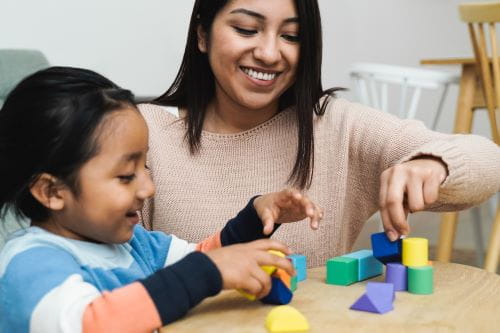Most families are well aware of the notion of “learning through play” and many wish to start this as early as possible with the babies and toddlers, using play activities at home to give their children a head start on their learning. For those families keen to learn and play with their children, just how involved should this be? Should you be constantly trekking to the craft store for craft supplies? Or stressing about how to make your activities? Here are seven useful tips for home-based learning through play with your children.
1. Have Fun and Be Creative
Choose brightly colored toys that have many functions and potential for different kinds of play. Set up a simple art area at home which could be as basic as crayons and paper, or easels, paints, and plastic aprons! Make a small and colorful book corner in your living room or child’s bedroom or set up a magnetic board in the kitchen with animals and letters. You are not setting up “school” but making a fun place for your child in which to discover, create, and explore.
2. Turn Off All Distractions
When engaging in play with your child, you would like them to focus and so should you! Is the television on? Turn it off! Is your phone near you, pinging with notifications? Move it to another room! If your child is not distracted by moving images, lights, or sounds, you should experience a more rewarding playtime that is concentrated and really captures the attention of both adults and children.
3. Be Creative with Reading
Your children are never too young to be read aloud to. You can employ silly voices as you read or dress up as your favorite character while you turn the pages. Fostering an early love of reading can aid your child’s cognitive and language spells and result in great bonding time as a family over shared beloved books. Bernard Toomey, a children’s psychology writer at Academized, says, “Reading a child’s favourite book can springboard to other activities like baking or craft activities related to the story or the characters. Use your imagination and your child’s will be nurtured, too.”
4. Always Encourage
Give your child a confidence boost during play by rewarding them with language that tells the child what they did was good. For example, “Look at you! You turned off the light!” A hug or a high five when they achieve even the very smallest thing in a play task, like placing a shape in the correct hole or identifying a picture of an animal, is wonderful encouragement. Keep up the fun energy and positivity!
5. Don’t Over-Schedule
Scheduling too many activities in the day or being too inflexible in a timetable can be counterproductive. Children need large amounts of time to have the freedom to play on their own and see where their imagination takes them. Make sure there is enough “down time” where your child is not tied to a time limit or too rigid a structure.
6. Allow for a Little Failure
Don’t try to micro-manage your child’s play too carefully and allow them to make mistakes so they can learn from them. It’s how adults do things, after all! Follow their lead, and let them fail, then, when they are successful in another small task, boost them with a little praise.
7. Explore the Sensory
Great fun, exploration, and discovery can come from engaging in sensory activities. Use a sandbox, water in a bucket outdoors, or a bowl of dried noodles, and let your child enjoy sensory play by drawing shapes, numbers and faces, or finger painting with water on an outside wall. Outdoor play gives plenty of scope for sensory activities, like swishing through piles of fallen leaves, messy play with mud or rocks, or even just walking barefoot on the grass. You could also set up a “sensory kitchen” outdoors with lots of potential for creativity and fun!
Play-based learning at home can be a whole lot of fun and very rewarding for both families and children. These tips should help in getting the most out of your play activities and how to lead your children in the right direction as they explore, grow, and learn!
About the Author

The opinions expressed in Montessori Life are those of the authors and do not necessarily represent the position of AMS. On this page |


